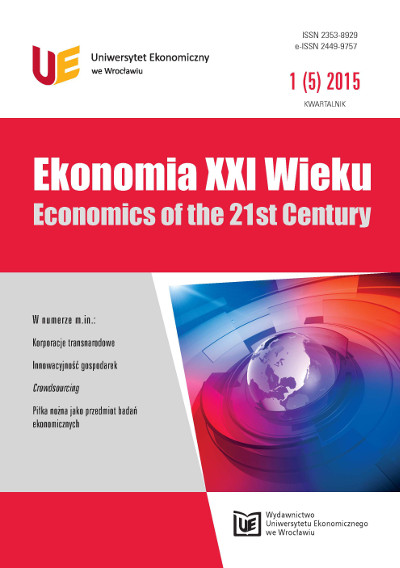Piłka nożna jako przedmiot badań ekonomicznych
Football as the subject of economic research
Author(s): Jan MurakSubject(s): Economy
Published by: Wydawnictwo Uniwersytetu Ekonomicznego we Wrocławiu
Keywords: sport; economics of sports; decision making; theory of games; efficiency
Summary/Abstract: For a long time football, despite being a very important part of modern world, and because of it an important part of the socio-economic sphere, has not been the subject of scientific considerations. Economists have been interested in new problems, including football, since L.C. Robbins proposed a definition of economics and G.S. Becker started his economic approach. Furthermore, the development of economic instruments helpsthose changes. The main purpose of this paper is to show the usefulness of economic methods and instruments in finding solutions of various problems. Therefore, we choose and describe a part of scientific, football research. At the beginning, we try to answer two questions. Why has not football been the subject of scientific consideration? Do football clubs differ from other firms? The second question is vital for businessmen. We present the most important, economic characteristics of a football club, for example: a diversity of sports clubs targets and the lack of incentives to monopolize markets. We argue that only a sum of all mentioned characteristics makes a football clubs managment special. In the next part, we present and try to assess different propositions which should make football matches more attractive. We find three groups of features, which should grow the demand for football matches. In the first group there are principles during a match. The second group is connected with the league system, and the last one refers to organizing big, football tournaments. The application of economic instruments gives arguments for and against various propositions. The most important results suggest that if only one type of fouls is punished, it does not improve the flow of the game. Furthermore, the results show that the effect of the rule of three points for a win on the game is ambiguous. It can improve the attractiveness of a match, but it also grows the number of fouls. Next, we discuss the effectiveness of football clubs and coaches. First of all, we try to find whether positions in the football leagues after a season match to clubs classifications of effectiveness well. For this purpose, we present the results of effectiveness research which use data set from Spanish leagues. The results differ from each other, thus we do not get a clear answer. In the next step, we show research about coach effectiveness which suggests that coaches should not be judged solely on the basis of a number of won matches.In the last part, we argue, that the use of the data set from football matches allows for empirical verification of the economic instruments and methods, on the one hand. On the other hand, it helps to solve many problems related to football. However, not all situations related to football are suitable for scientific research. Part of them are too complex.
Journal: Ekonomia XXI Wieku
- Issue Year: 2015
- Issue No: 05
- Page Range: 138-151
- Page Count: 14

